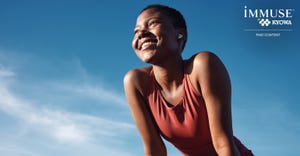InSea2® Studies Accepted for Publication
October 3, 2011
.png?width=850&auto=webp&quality=95&format=jpg&disable=upscale)
RIMOUSKI, QuebecInSea2®, a brown seaweed ingredient from innoVactiv inc., was recently supported with scientific studies; both showed it to beneficial to post-meal blood sugar and insulin levels. The studies have been accepted for publication in peer-reviewed scientific journals.
The first study, accepted for publication in Food Research International, features in vitro experiments showing the dual mechanism of action of InSea2® against alpha-amylase and , alpha-glucosidase enzymes, as well as results demonstrating the carb-blocking effect of InSea2® in laboratory animals. In vitro, InSea2 completely inhibited in a dose-dependent fashion alpha-amylase and alpha-glucosidase with very low IC50 values compared to other plant polyphenols. In animals, the InSea2 extract was able to reduce the normal increase in postprandial blood glucose seen 30 minutes after a meal by 90 percent (P<0.05), and consecutively reduce peak insulin secretion by 40 percent. Researchers said these results demonstrate the potency of InSea2 to beneficially modulate carbohydrate digestion and assimilation, in a way that would be suitable for use in foods and dietary supplement formulations.
The second study, accepted for publication in Applied Physiology, Nutrition and Metabolism, presents results from a recent positive human clinical trial where InSea2® significantly reduced post-meal blood glucose response. Twenty-three participants (11 men, 12 women) aged 19 to 59 years were recruited in this double blind, randomized, placebo-controlled crossover study. The subjects consumed two 250 mg-seaweed and two placebo capsules 30 minutes prior to consumption of 50 g of carbohydrates from bread. Compared with placebo, consumption of seaweed was associated with a 12.1-percent reduction in the insulin incremental area under the curve (AUC) (P=0.04, adjusted for baseline) and a 7.9-percent increase in the Cederholm index of insulin sensitivity (P<0.05). The single ingestion of 500 mg of InSea2 had no significant effect on the glucose response (P=0.24, adjusted for baseline). Glucose and insulin responses were similar between men and women. Consumption of the seaweed capsules was not associated with any adverse event. The results were originally disclosed at the 2010 Experimental Biology meeting in Anaheim, CA.
You May Also Like




.png?width=800&auto=webp&quality=80&disable=upscale)